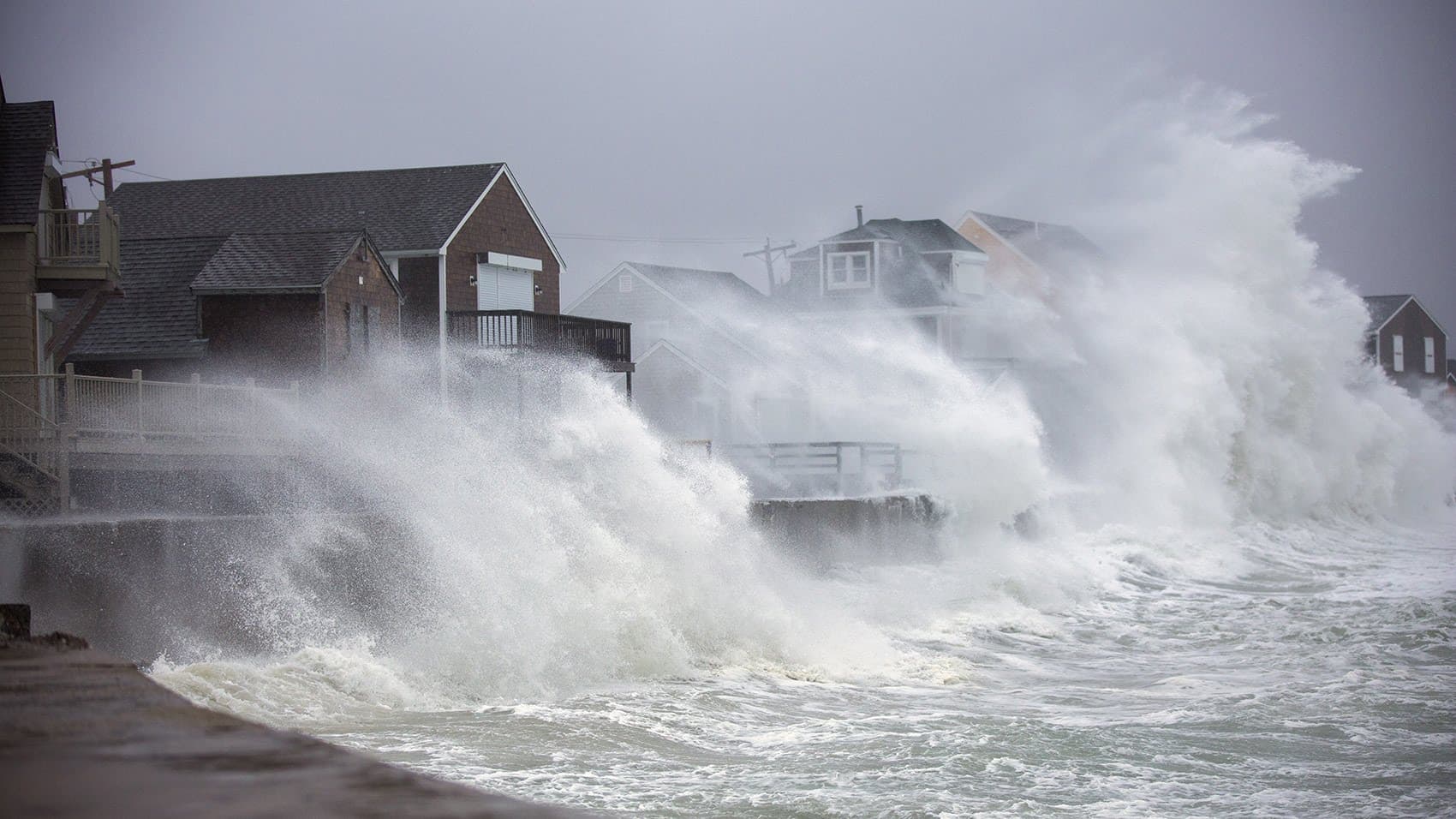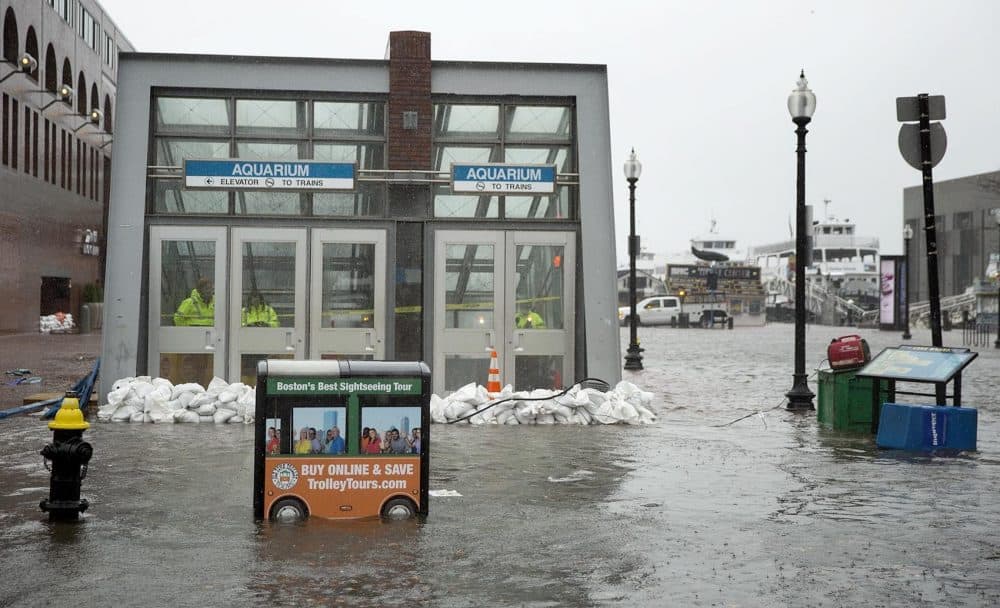Advertisement
Amid Storms' Destruction, Climate Bill Pressure Grows On Mass. House

While crews shore up seawalls and coastal infrastructure and residents brace for another powerful storm, a coalition that includes architects, engineers, planners and downtown Boston businesses is putting pressure on the House to pass a bill requiring the state to plan for the effects of climate change.
The Massachusetts Climate Change Adaptation Coalition sent a letter Monday to all state representatives urging them to reach out to House leadership and ask for action on a bill (S 2196) requiring the state to develop a comprehensive adaptation management action plan in response to climate change.
The Senate unanimously passed the bill in November and has passed it in previous years as well.
The coalition — which includes dozens of organizations that represent architects, engineers, planners, and conservationists — said that while Massachusetts has taken steps to address the economic risks of climate change, "we lack an integrated approach to resiliency."
Rep. Frank Smizik, who chairs the House Committee on Global Warming and Climate Change, plans to send a similar letter to his House colleagues this week, the coalition said. Smizik's office did not return a call from the News Service on Wednesday.
One member of the coalition who represents more than 100 Massachusetts businesses gave voice in a new op-ed to the importance of having a comprehensive plan to address the effects of climate change.
"Lack of climate adaptation across our community can cost businesses a lot. The price tags are in the billions for damage from flooding, extreme temperatures and sea level rise combined with disruptions to business continuity and lost outputs," Rick Dimino, president and CEO of A Better City, wrote in Banker & Tradesman on Sunday. "This past fall, Moody's announced that it would be giving more weight to climate risk mitigation measures coastal communities are undertaking in its bond credit rating analysis. We can't afford to suffer these financial losses."
Advertisement
The coalition pointed to a 2013 study led by a World Bank economist that found Boston loses $237 million in economic activity each year due to coastal flooding — the eighth-highest amount of any metropolitan area in the world.
And if storms continue to get stronger and more damaging, the potential losses could be even greater. There are 4.2 million residents — or about 66 percent of the total population — living within 10 miles of the coast and parcels of land within 10 miles of the coast total $750 billion in assessed value, 73 percent of the state's total valuation, according to the Metropolitan Area Planning Council.
Dimino said A Better City in January formalized its first-ever energy and environmental policy agenda that included "strong and unequivocal support" for the bill filed by Sen. Marc Pacheco.
The bill would require key state agencies to develop a comprehensive adaptation management action plan in response to climate change and update it every five years. It would also continue a grant program that provides technical assistance for communities.
"We have the ability to protect ourselves, our communities, but we need the political will in place to take action."
Sen. Marc Pacheco
The damage left behind by the strong nor'easter that lashed the Massachusetts coast over the weekend led Pacheco to take to the Senate floor Monday to call for action on his bill. The bill passed the Senate unanimously in November and has been pending before the House Ways and Means Committee since.
"We should see the writing on the wall. If gone unchecked, severe weather will wreak immense havoc on Massachusetts, it is already happening. It continues to happen. Our communities, our cities and towns, are facing serious financial risks. Homes are being destroyed, properties are being ravaged," he said. "We have the ability to protect ourselves, our communities, but we need the political will in place to take action. Climate adaptation recommendations need to become requirements in state law."
Pacheco said the Senate has passed a version of the legislation five times, but it has never cleared the House. While they have not become law, some aspects of the bill are already state policy. Gov. Charlie Baker in September 2016 ordered his administration to put together a climate change adaptation plan and work on reducing carbon emissions.
House Speaker Robert DeLeo, whose hometown of Winthrop has been battered by storms, on Monday pushed back on the suggestion that the House has been reluctant to pass climate change adaptation legislation, and said the issue has been that "probably the legislation has been far more encompassing than" simply climate adaptation.
"You'll probably see us address some of these issues, but probably more piece-by-piece pieces of legislation as opposed to an overall piece," the speaker said Monday.
He added, "I think that's going to be one of the things, but I think it's going to be only one of the things" and said, "we have to talk something more even on a short-term basis as well."
House Majority Leader Ron Mariano, who leads a special House working group meant to respond to Trump-era federal policy, said Tuesday that his group has considered the climate adaptation management plan bill and is "also in discussions now with putting that bill on the agenda and getting it moving."
Baker, who lives near the beach in Swampscott, said Monday that Massachusetts needs to "take a really big look at some of the strategies other people have used to deal with some of these issues."
"If you look at some of these places that we toured over the weekend, they're just going to keep getting hit every time there's a big storm and a big tide," Baker said. "And that means we're going to need some different answers for this."
Asked about specific strategies he might be referring to, the governor said, "Other people have used marshes and culverts and other devices to redirect water. People have done stuff with respect to zoning. People have changed the way they organize their flood plans. We have a lot of work to do on this one."

Pressing for an immediate step the state could take to combat climate change, the MassDivest Coalition — a group of environmental, labor, education, social justice and financial management organizations — on Wednesday renewed its call for Massachusetts to divest state pension funds from holdings in fossil fuel companies.
A Rep. Marjorie Decker bill (H 3281) would require the Massachusetts Pension Fund to completely divest from all thermal coal companies within five years. It would also form a commission to study more sweeping divestments from fossil fuel companies, and require the pension fund to follow the recommendations made by the commission.
"The urgency to combat climate change is abundantly clear," Decker said in a statement. "Massachusetts has the opportunity to model what good public policy looks like."
The coalition said Massachusetts holds approximately $40 million in coal investments in its retirement portfolio.